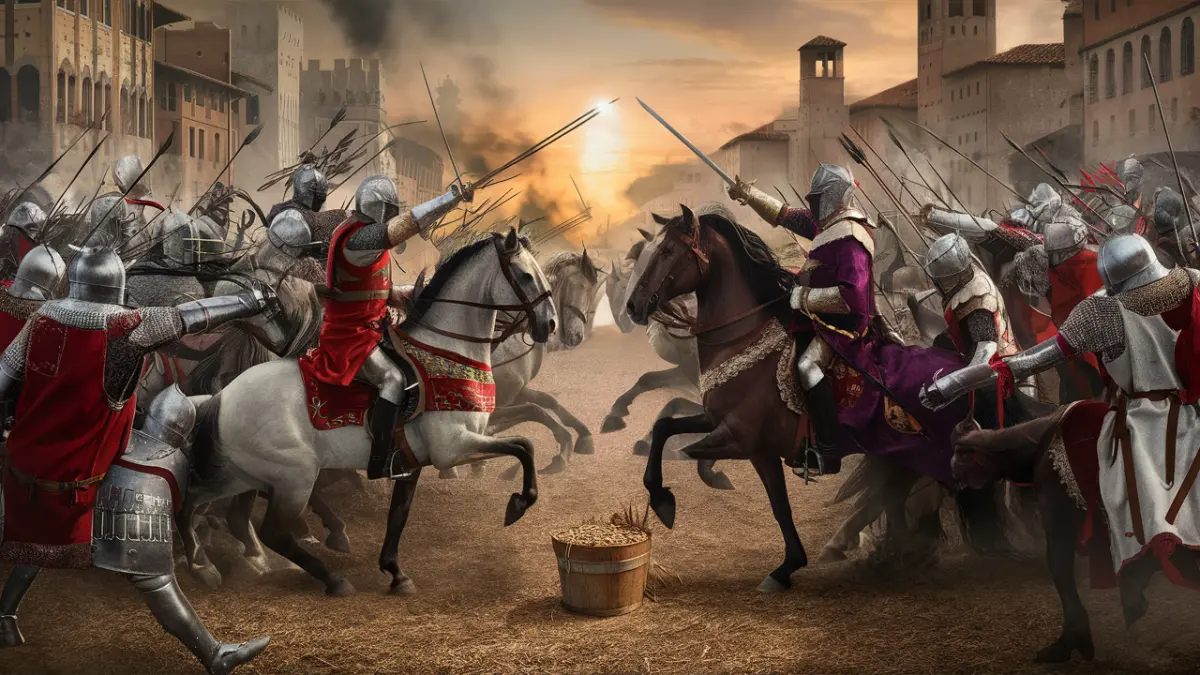Most Unusual Reasons for War in History: When Llamas and Pastries Triggered Battles

History is chock-full of wars started for reasons that will make you do a double-take. Some conflicts weren't sparked by lofty goals or grand disputes, but by things as unexpected as livestock or even stray animals. Why did nations really go to battle over such trivial reasons?
Popular Misconceptions:
- Wars are always about grand, noble causes.
- Most conflicts stem from significant territorial disputes.
- Soldiers always fight for deeply rooted nationalistic reasons.
Turns out, not all wars were born of deep, meaningful grievances. Sometimes, the triggers for conflict can be downright bizarre, proving that the world stage is often just as strange as it is serious.
1. Pig War
The Pig War sounds a bit ridiculous, right? Believe it or not, this 1859 stand-off between the United States and Great Britain started because of a pig. It all kicked off in the San Juan Islands, a beautiful spot between Vancouver Island and the Washington Territory.
Here's the gist: an American farmer's pig wandered over to a British neighbor's garden and started munching on veggies. The British neighbor, not thrilled, shot the pig. Tempers flared, and soon both nations had troops on the islands, ready to fight over this pig problem.
Luckily, cooler heads prevailed, and nobody got hurt—except the pig, of course.

Big Misconceptions About Pig War:
- It wasn't a real war; no battles were fought.
- It didn't solve any major political issues.
Today, the Pig War is a quirky piece of history, reminding us of how small events can lead to big disputes.
2. War of Jenkins' Ear
The War of Jenkins' Ear might just have the most bizarre trigger in history. It all started in 1731 when Spanish coast guards caught English captain Robert Jenkins smuggling goods. They sliced off his ear and sent him on his way.
Eight years later, Jenkins showed his severed ear to the British Parliament, and the outraged Parliament declared war on Spain in 1739.
Misconceptions:
- Not just about an ear: The severed ear was a symbol of deeper tensions over trade and colonial territories.
- Lasted longer than you think: The war dragged on until 1748, though most of the fighting fizzled out by 1742.
- More than the Caribbean: Battles occurred in places like Georgia and Florida.

3. The Pastry War
Ever heard of a war started over baked goods? The Pastry War between Mexico and France in 1838 happened exactly because of that.
A French pastry chef in Mexico claimed Mexican army officers messed up his shop. He demanded compensation, but Mexico said no.
France got involved and sent warships. They didn't just send a strong letter!
The fighting lasted a few months before Mexico finally paid up.
Strange how pastries caused international conflict!
4. The War of the Oaken Bucket
Imagine going to war over a bucket. Sounds bizarre, right? Yet, that's exactly what happened in 1325 between the Italian city-states of Bologna and Modena. It wasn't just any bucket; it was an oaken pail taken by soldiers from Modena.

This quirky skirmish was part of a larger rivalry between the Guelphs and Ghibellines, which were two opposing factions in medieval Italy. The bucket theft was just the spark that ignited this odd conflict.
The War of the Oaken Bucket provides a fascinating glimpse into the turbulent politics of the time. A single bucket led to the Battle of Zappolino, the only major clash in this little war. And guess what? Modena emerged victorious and kept the bucket!
5. The Nika Riots
The Nika Riots in 532 AD were a week-long rampage in Constantinople. The spark? Chariot races and a couple of factions, the Blues and Greens, not happy with Emperor Justinian I.
Tensions were already high. High taxes, corrupt officials, and a few executions made things worse. Soon, the chants of "Nika!" (meaning "Conquer!") filled the streets, and the city went up in flames.
- Nearly half of Constantinople was destroyed.
- Tens of thousands were killed.
- Emperor Justinian almost lost his throne.
6. The Football War
The Football War was one of the most bizarre conflicts in history. It wasn't just about soccer, though. El Salvador and Honduras had tensions brewing for years.
It kicked off on July 14, 1969, when Salvadoran troops invaded Honduras.
The brief conflict lasted 100 hours.
Biggest Misconceptions:
- It was only about soccer.
- It lasted more than a week.
- It resolved all issues between the countries.
7. Emu War
The Emu War might sound like something straight out of a comedy sketch, but it was a real event in Australia's history. In 1932, farmers were struggling with emus destroying their crops. The government decided to act.
They deployed soldiers armed with machine guns to deal with the emus.

The emus, however, proved to be more agile and resilient than anticipated. Despite the army's efforts, the birds largely evaded capture. This led to one of the most unique and unsuccessful military operations.
Some misconceptions:
- It wasn’t a war in the traditional sense.
- The emus didn’t intend to "fight;" they were simply foraging.
8. War of the Stray Dog
In 1925, a dog caused a pretty absurd international conflict between Greece and Bulgaria.
It all started when a Greek soldier chased his stray dog across the Bulgarian border. A Bulgarian guard, feeling trigger-happy, shot the Greek soldier.
This led to a brief but intense skirmish with casualties on both sides.
It’s a classic example of how even the smallest things can spark major events.
9. War of the Golden Stool
The War of the Golden Stool began in 1900. It happened between the British Empire and the Ashanti Empire in modern-day Ghana.
The conflict started because the British demanded to sit on the Golden Stool, a sacred symbol of the Ashanti.
Biggest Misconceptions:
- The Golden Stool is just a fancy chair. Nope! It’s a symbol of power and unity for the Ashanti.
- The British wanted the stool because it was valuable. Actually, they saw it as a sign of control.
10. The Russo-Polish War over a Bear
Imagine fighting a war over a bear. Sounds wild, right? Yet, one unusual moment in the Russo-Polish War involves exactly that.
During this conflict, legend has it a bear wandered into a battlefield. Both sides wanted the bear as a mascot. Tensions flared, shots were fired, and suddenly, a bear was at the center of a skirmish.
Biggest Misconceptions:
- Real Fights Over Bears Never Happen: They do!
- Wars are Always Because of Big Politics: Not always, sometimes it's about a bear.
Economic Motives Behind Wars
Economic motives often drive nations into conflict. Many wars center around controlling valuable resources or maintaining favorable trade conditions.
Resource Exploitation
Nations often go to war to control valuable resources. These resources can be anything from minerals and oil to land and water. Controlling these resources can give a country power and prosperity. For example, oil-rich regions have seen countless conflicts due to the desire to control this precious resource.
Throughout history, countries have invaded others to seize fertile land. For instance, colonial powers sought to exploit the natural wealth of their colonies. This meant extracting minerals, crops, and other resources, often leading to conflicts with native populations.
Moreover, wars over resources can also be internal. Civil wars sometimes ignite over control of a region's resources. Different factions fight to gain ownership and, therefore, economic power.
Trade Conflicts
Trade wars can escalate into real wars. Nations rely on favorable trade terms to ensure their economic stability. When these terms are threatened, tensions can rise quickly. For instance, blockades or tariffs can spark conflicts as nations fight to protect their economic interests.
History has seen wars break out due to disrupted trade routes. Control of strategic trade chokepoints, like the Strait of Hormuz or the Suez Canal, is crucial. Countries have fought to maintain or gain this control to ensure that their trade routes remain open and profitable.
Protectionism can also lead to conflicts. When one country imposes heavy tariffs on imports, it can trigger a retaliatory response. This tit-for-tat escalation can, in extreme cases, lead to all-out war, as seen in various historical trade disputes.
Personal Vendettas Leading to Wars
Throughout history, personal conflicts and grudges have unexpectedly ignited full-scale wars. These wars often started from personal vendettas involving royal rivalries and personal slights.
Royal Rivalries
Royal rivalries have long triggered wars. A famous example is the 12th-century conflict between Thomas Becket and King Henry II of England. The dispute began when Becket, once a close friend of Henry, became Archbishop and defied the king's authority. It escalated to the point where Henry’s fiery words led to Becket’s murder, causing outrage and uprisings.
The War of the Roses in 15th-century England further illustrates royal feuds. It was a bitter struggle for the English throne between the houses of Lancaster and York, stemming from deep-seated animosities and claims to the crown. Key battles included the Battle of Towton where personal grudges led to intense and bloody confrontations, leaving an indelible mark on English history.
Key Conflicts in Royal Rivalries:
- Thomas Becket vs. Henry II
- War of the Roses
- Lancaster vs. York
Personal Slights and Honors
Wars sparked by personal slights are as dramatic as they are senseless. The War of Jenkins’ Ear (1739-1748) started after a British captain, Robert Jenkins, had his ear cut off by Spanish coast guards. He presented the severed ear to the British Parliament, leading to a war fueled by national honor and personal revenge.
Another peculiar conflict is the War of the Stray Dog in 1925. It began when a Greek soldier crossed into Bulgarian territory chasing his runaway dog, leading to a military clash. This trivial incident spiraled into a significant conflict, driven by pride and territorial defiance.
Notable Examples of Personal Slights:
- War of Jenkins' Ear
- War of the Stray Dog
- Robert Jenkins vs. Spanish coast guards
Religious and Superstitious Causes
Wars often spring from unusual and unexpected triggers. Religion and superstition have played their parts in human history, leading to conflicts that might seem bizarre now.
Holy Wars
Some conflicts have started because of religious beliefs. The Crusades are a famous example. These wars began when Christians wanted to reclaim Jerusalem from Muslim control. Religion motivated many soldiers to fight. It was seen not just as a military adventure but a holy mission. The Thirty Years' War also had religious roots, starting as a battle between Catholic and Protestant states in Europe. Though it got more political over time, the religious divide sparked the initial conflict. These wars show how deeply held beliefs can drive people to take extreme measures.
Mystical Predictions
It isn't just organized religion that sparks wars. Superstitions and mystical predictions have also led to conflict. Take the British Indian Mutiny of 1857. Some soldiers believed that their gun cartridges were greased with cow and pig fat, violating Hindu and Muslim religious practices. This belief fueled widespread rebellion. Another example is the Taiping Rebellion in China, which was led by a man who believed he was the younger brother of Jesus Christ. These mystical beliefs, though strange to some, were powerful enough to lead to massive uprisings and wars.
